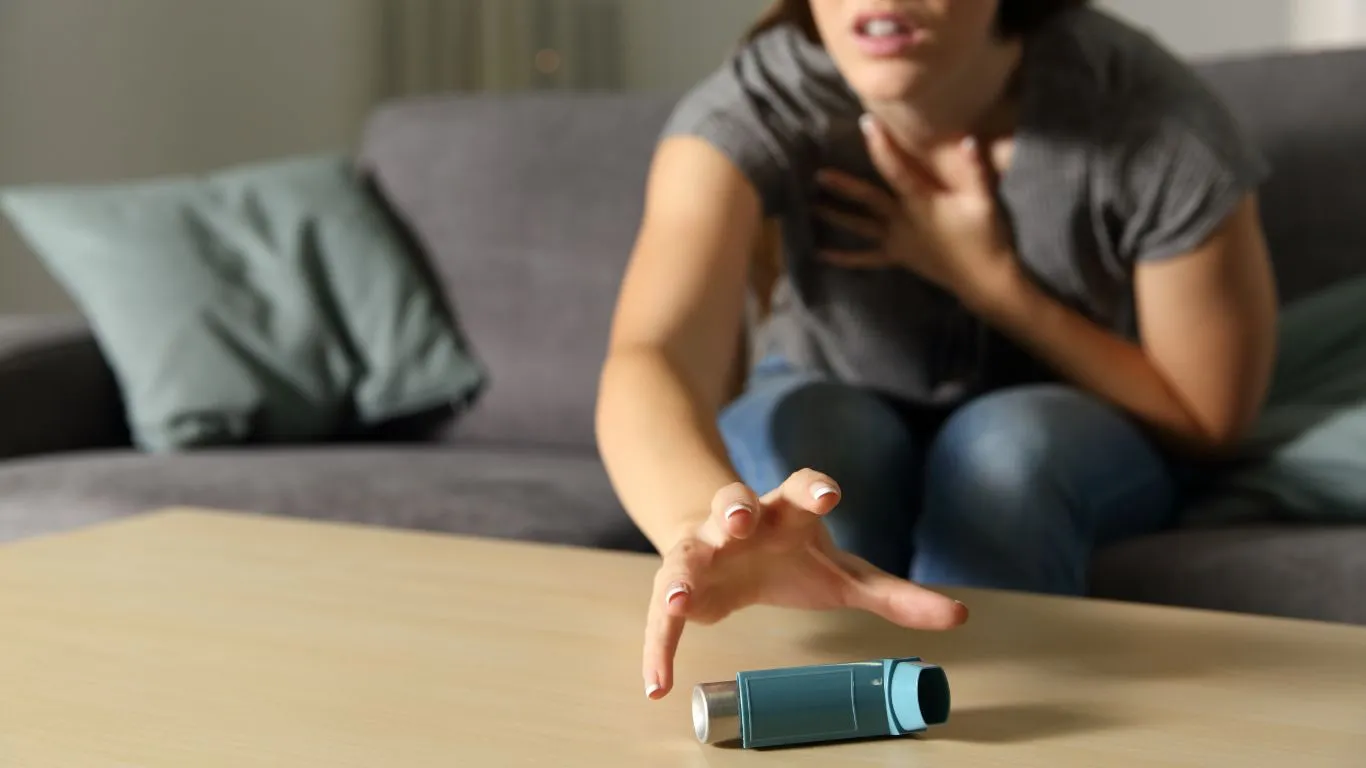How to Manage Asthma in Humid Climates: 10 Simple Tips 🌬️💨
So, you live in a humid place, and asthma is just one of those things that gets worse when the air’s all sticky and damp. If you’re like me, you probably know how tough it can be to catch your breath when the humidity’s up, or when the weather turns muggy. But don’t worry – I’ve got your back!
In this post, we’re gonna go over some super simple tips for dealing with asthma in humid climates, including some stuff that’s worked for me (and others). Plus, we’ll troubleshoot some common problems, share success stories, and get into some frequently asked questions. Ready? Let’s dive in!

Why Humidity Makes Asthma Harder 🌧️
Alright, first things first – let’s talk about why humidity even messes with asthma. When the air’s all soggy, it can irritate your airways and cause inflammation, which makes it tougher to breathe. Also, things like dust mites, mold, and pollen love hanging around in humid air, which makes your asthma flare up even more.
If you’ve ever felt like you’re gasping for air when the weather’s muggy, then yeah – you’re not alone. Humid climates can definitely throw a wrench in your asthma control, but trust me, there’s a way to stay on top of it.

10 Tips to Keep Your Asthma in Check in Humid Climates 💡
- Keep an Eye on Humidity Levels 🌡️If you’re living somewhere humid, the first thing you need is a hygrometer. It sounds fancy, but it’s basically just a tool to measure humidity in your home. You want your indoor humidity to be between 30% and 50%. If it goes higher than that, grab a dehumidifier – they really help take the edge off.
- Air It Out (But Not Too Much!) 🌬️Ventilation is key, but you don’t want to be letting all that sticky air into your house. I usually crack windows when I can, especially when it’s cooler outside, and make sure the exhaust fans in the bathroom and kitchen are running. You don’t want that damp air sitting around, causing all sorts of issues.
- Invest in an Air Purifier 🌀If you haven’t already, a HEPA filter air purifier is your best friend in a humid climate. These bad boys filter out dust, mold spores, and other allergens that tend to thrive when the air’s damp. I’ve used one in my bedroom, and it really helped cut down on morning congestion.
- Maintain Your AC ❄️Air conditioning isn’t just about cooling down your space – it’s also about keeping the humidity in check. Make sure you clean the filters regularly, because if they’re clogged, the system can actually make the air worse. Trust me, you don’t want to be breathing in dirty air.
- Wash Bedding and Curtains Often 🛏️Bedding and curtains can trap moisture, which leads to all kinds of allergens building up. You don’t need to go overboard, but a good wash once a week or every other week will help keep things clean and fresh.
- Fight Mold Like a Pro 🦠Mold is the worst when you have asthma. It loves damp places, so check areas like your bathroom and basement for mold. If you spot any, clean it up with some water and vinegar or a mold cleaner. I’ve found that just keeping the house dry really helps prevent it from coming back.
- Stick to Your Meds (Even When You Feel Fine) 💊It can be tempting to skip your asthma meds when you’re feeling good, but in humid weather, you really need to stick with your routine. I’ve had times where I thought I didn’t need my inhaler, and then bam – I’m struggling to breathe again. Don’t make that mistake!
- Wear a Mask Outdoors 😷I know, masks aren’t the most fun, but if the humidity’s off the charts and allergens are high, a mask can really help. It’s especially helpful if you’re heading out for a walk or run. You’ll thank me later when your lungs don’t feel like they’re on fire.
- Drink Water Like It’s Your Job 💧Hydration is super important for asthma control, and it’s especially true in humid climates. The more hydrated you are, the thinner the mucus in your airways stays, making it easier to breathe. I always keep a water bottle handy.
- Know Your Triggers ⚠️If you’re like me, you’ve probably got a few asthma triggers. Maybe it’s mold, maybe it’s the heat, or maybe it’s a specific pollen. Pay attention to what sets you off, and adjust your routine accordingly. For me, I’ve noticed that when it rains, my asthma gets worse, so I make sure to take extra precautions those days.

Troubleshooting Common Problems 🔧
Breathing Issues When It’s Super Humid
If you’re struggling to breathe when it’s super humid, try using your inhaler before you go outside. Also, staying indoors with the AC on or using a dehumidifier can really help. I usually keep the AC on when it’s sticky outside, just to keep the air cool and dry.
Mold and Dust Problems
If mold or dust is causing a problem, it’s time for a deep clean. I use a vacuum with a HEPA filter, and I’m pretty meticulous about wiping down surfaces. If mold’s an issue, get rid of it ASAP with the right cleaner.
Success Stories: Real-Life Wins 🌟
Emily’s Journey with Humidity Control
Emily lives in a coastal city where humidity is a constant battle. She started using a dehumidifier and noticed a huge difference in her asthma symptoms. She also invested in an air purifier, and her asthma attacks became much less frequent. She swears by keeping track of her home’s humidity levels with a hygrometer – it’s been a game-changer.
Mark’s Outdoor Strategy
Mark’s an outdoorsy guy who loves to run, but the humid summer months used to slow him down. After starting to wear a mask while running and drinking a ton of water, his asthma attacks became less intense. Now, he schedules his runs early in the morning when the air is a little drier.

Key Takeaways / Summary 📝
- Humidity can make asthma worse by irritating your airways and increasing allergens.
- To manage asthma in humid climates, keep your indoor humidity levels between 30% and 50%, use a dehumidifier, and make sure your air is clean with a good purifier.
- Regularly monitor your symptoms, stay hydrated, and stick to your meds, even if you’re feeling fine.
- Real-life success stories show that taking simple steps can make a big difference in managing asthma.
FAQs 🤔
How do I know if my home’s humidity is too high?
Get yourself a hygrometer! It’s a cheap, easy tool to measure humidity, and you want to keep it between 30-50% for optimal asthma control.
Can humidity make asthma worse?
Yep, humidity can mess with your breathing by inflaming your airways and making allergens like mold and dust worse.
How do I fight mold in a humid house?
Keep things dry and ventilated, use a dehumidifier, and clean mold spots with a mix of water and vinegar or mold cleaner.
Can I exercise outdoors in humid weather?
It’s tough, but you can. Just wear a mask, stay hydrated, and try to exercise in the early mornings or evenings when the air is drier.
Disclaimer ⚖️
This info is just to help you out and isn’t a replacement for professional medical advice. Always check in with your healthcare provider to figure out what’s best for you.
Call to Action 💬
Managing asthma in humid climates doesn’t have to be a battle. Start making small changes, and let me know what works for you! Drop a comment or share your own tips – we’re in this together!

Bianca Nala is a compassionate Nurse Practitioner with a strong background in primary and respiratory care. As a health writer for Healthusias.com, she combines her clinical expertise with a talent for clear, relatable storytelling to help readers better understand their health. Bianca focuses on topics like asthma, COPD, chronic cough, and overall lung health, aiming to simplify complex medical topics without losing accuracy. Whether she’s treating patients or writing articles, Bianca is driven by a single goal: making quality healthcare knowledge accessible to everyone.







